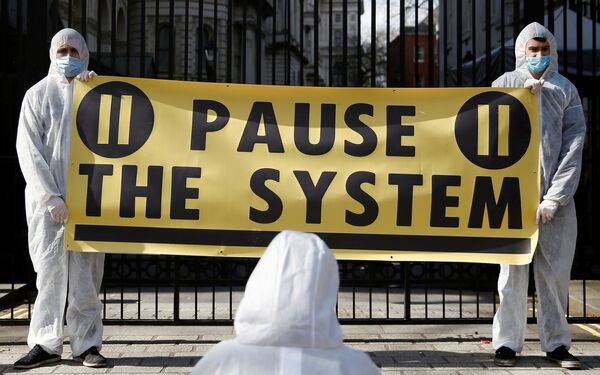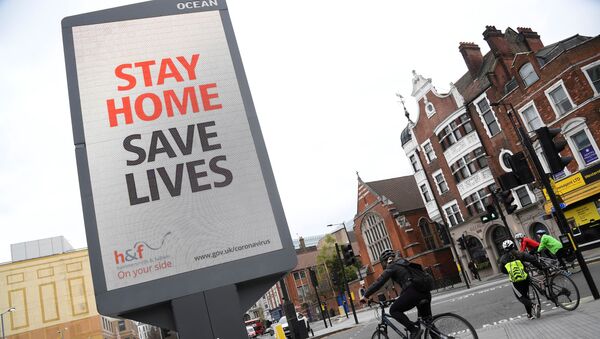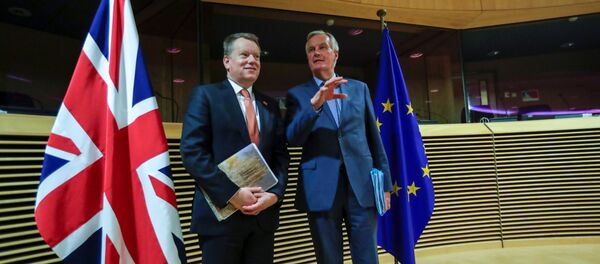Fitch Ratings slashed the UK's credit rating from AA to the less favourable AA- on 28 March citing the weakening of the country's public finances due not only to the coronavirus outbreak, which to date has infected 17,000 Brits, but also London's "fiscal loosening stance". The agency stressed that the latter emerged long before the coronavirus pandemic did.
Credit Rating Cut Was Expected
Dr George Theocharides, associate professor of finance at the Cyprus International Institute of Management, agrees with Fitch's assessment of the impact of the coronavirus on the British economy. He adds that the move to cut its credit rating was "unavoidable" due to the potential increase in the UK's debt and was thus expected.
"The restrictive measures imposed across the globe create a significant negative impact on the UK and global economy and thus the government needs to step up and provide fiscal stimulus. This fiscal stimulus is needed to reduce the number of bankruptcies and massive layoffs of workers. This will increase the debt level of UK in the short-term", Theocharides said.
At the same time, the professor notes that if London wants to stop the spread of COVID-19, it will need to invest not only in the economy, but also in the healthcare system, at expense of increasing the nation's debt.

Ahead of Fitch's reassessment of the country's credit rating, UK Chancellor of the Exchequer Rishi Sunak on 27 March announced that some 60 billion pounds ($74.6 billion) in public spending will be allocated to fight the virus after another 30 billion ($37.37 billion) was promised to support businesses in the form of a fiscal stimulus.
In light of this intervention by the Chancellor of the Exchequer, the agency's decision did indeed come amid "some degree of expectancy", professor of international business law at the University of Hull, Christopher Bovis says. He explains that the coronavirus "paralyzed" the British economy and caused the restructuring of strategic sectors, as well as the "massive" fiscal stimulus, which will not leave the economy unaffected.
"The public finances of the UK do not look good in the medium-to-long run spectrum [...] The current Chancellor of the Exchequer has departed from the position [of keeping the fiscal discipline] and in effect the UK is seen to have loosened its fiscal controls and revert to heavy borrowing exposures in the short and medium term. It would not be a surprise if the UK’s economic output falls 3 to 4 percent this financial year", Bovis forecasted.
Not Just Coronavirus
The ongoing coronavirus-induced crisis in the British economy comes at an unfortunate time for London as it is preoccupied with navigating out of a transitional period after Brexit into an era of new trade relations with both the EU and the rest of the world. However, the details of these relations remain vague, as London continues to negotiate a deal with Brussels to avoid a no-deal scenario.

This uncertainty around the UK's post-Brexit future is another factor that contributed to Fitch's decision, believe Theocharides and Bovis. Doubts regarding the UK and the EU reaching a trade deal first emerged even before the COVID-19 pandemic broke out in Britain as the two had already started "down a path of confrontation and aggressive rhetoric", Bovis notes. The professor elaborates that reaching a deal with the EU is of utmost importance for London as its economy relies heavily on money from the Eurozone.
"The UK has a very investment-friendly regulatory regime, which also served up to now with the UK being an EU member state, as a springboard for EU-wide capital investment via private equity and also sovereign funds. This benign environment will end in eight months and the uncertainty is already creeping into policy makers’ assessments as to what will replace the net of regulatory interfaces between UK and EU, but also the rest of the world", Bovis explained.
The economist sums up that "optimism is in short supply" with regard to the future of the UK economy after Brexit and is mainly due to the prospects of London's trade deals with foreign countries remaining "weak".






